Olympic Champs Serbia Deal U.S. Men Tough Loss at FINA World Water Polo Cup
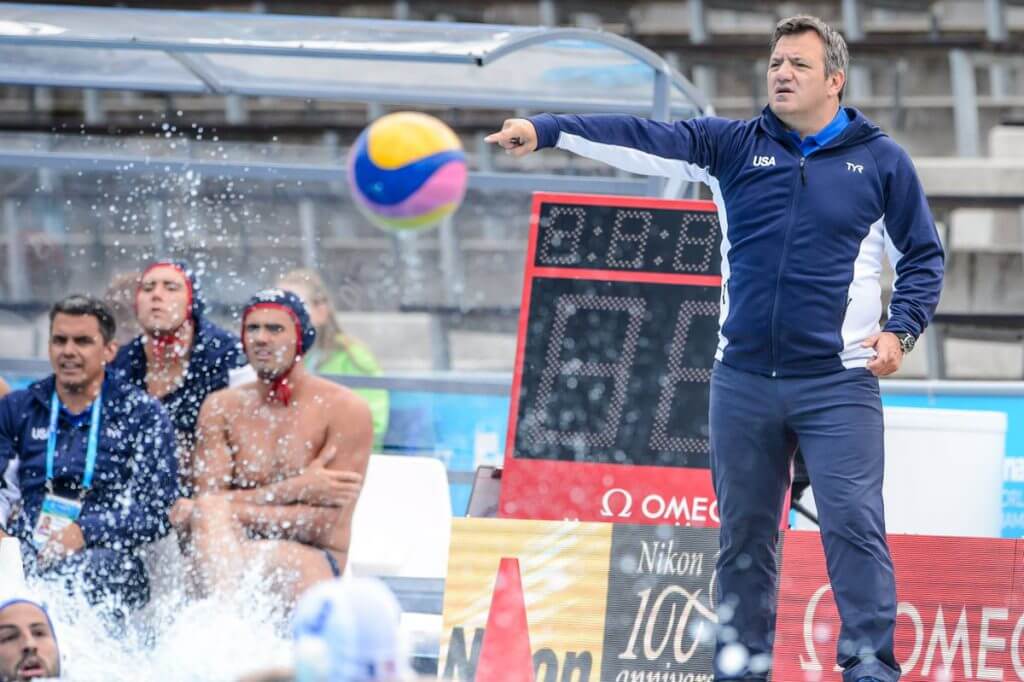
By Michael Randazzo, Swimming World Contributor
BERLIN, Germany. Perhaps overlooked in the focus on new rules and the positive feelings generated by the hometown German team’s success is that there is something else at stake here at the Europasportpark: four spots at the 2019 FINA World Water Polo Championships, to be held next July in Gwangju, South Korea.
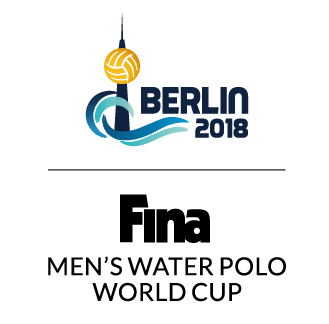
Two days into the FINA World Water Polo Cup 2018, Germany, playing in front of sparse but enthusiastic crowds, thus far seems likely to claim one of those spots. After beating a young Hungarian team (1-1 Group A) on Tuesday night, Head Coach Hagen Stamm’s squad caught the Japanese (0-2 Group A) by surprise Wednesday night, winning a very entertaining game by a score of 14-9. The Germans (2-0 Group A) are at the top of their group and looking to sweep the competition when they face Australia (1-1 Group A) in the late game Thursday night.
On the opposite end of the spectrum is Team USA (0-2 Group B). A loss to Croatia (2-0 Group B after a 25-2 win over 0-2 South Africa) on Tuesday was followed last night by a 14-8 defeat at the hands of Olympic champion Serbia (2-0 Group B), limiting the U.S. chances for a top-four finish.
For the second consecutive day, the Americans went up 1-0 on their first possession, as Alex Bowen hammered a goal past Serbian goalie Dimitri Risticevic. But, like yesterday’s loss to Croatia, Team USA’s joy was short-lived. The Serbs came right back and tied the score on their next possession, as Dusan Mandic executed a fantastic windmill strike on a five meter penalty that U.S. goalie McQuin Baron didn’t lay a finger on.
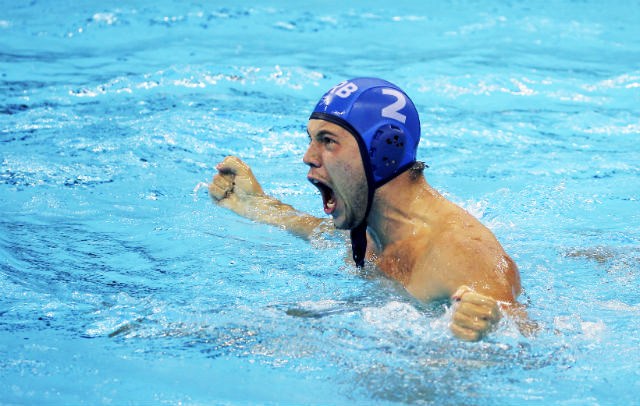
Dusan Mandic. Photo Courtesy: Total Waterpolo
On the next two Serbian possessions, Mandic proceeded to hit long bombs from beyond six meters. His natural hat-trick was part of an early barrage on Baron that resulted in a 6-3 U.S. deficit after one period.
The second and third periods were no better; the Serbians scored six times to the Americans’ one, creating a nine-goal gap. That deficit was the result of a couple of visible defensive breakdowns, as Gavril Subotic twice knifed through the U.S. defense to score on lob passes from the outside. It was only in the final period, when Max Irving, Bowen, Ben Stevenson and Ben Hallock scored, that the U.S. made the score appear much more competitive than the actual match.
When asked after the Serbia match if his team would finish in the top four and qualify for 2019 Worlds, U.S. Head Coach Dejan Udovicic was characteristically blunt:
“We would like to qualify from here but we will see,” he said. “Right now, it’s not looking like that.”
This potentially creates a complex situation for the Americans that involves qualifying through a Union Americana de Natacion (UANA) tournament early next year. Regardless of what the future holds, Wednesday’s performance underscored that growing pains remain in the pipeline talent development program John Abdou, USA Water Polo’s Chief High Performance Officer put in place when Udovicic was hired in May 2013.
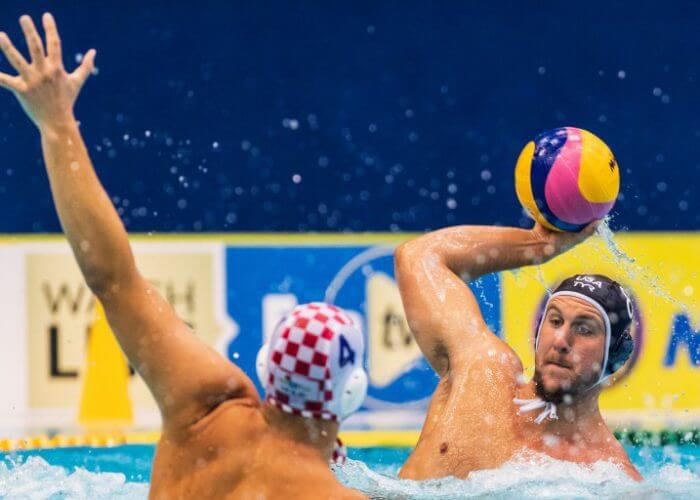
Photo Courtesy: FINA
Most of the competition in Berlin has been preparing since early August, Udovicic said, while the U.S.—where essential contributors Luca Cupido, Alex Roelse and Baron have yet to complete their degrees—simply hasn’t had as much time to train. Some of the country’s top players are understandably not on this trip; Marko Vavic and Hannes Daube are at USC; Alex Wolf is at UCLA.
Others’ futures are uncertain, which makes Udovicic’s job that much more difficult. Bret Bonnani is unlikely to return for 2020, and John Mann, one of Team USA’s more important players due to his position (center) and depth of experience—including multiple years playing professionally—is so far non-committal.
The benefit of bringing a team young in both age and experience—Hallock, Johnny Hooper, Jack Turner and Dylan Woodhead skipped college practice and matches to be here—is there’s nothing better for developing some of Udovicic’s prized young players than experience against Europe’s top national teams.
“We don’t have so many quality international tournaments where you can test some of them,” he said. “This is one of those occasions.”
Unlike the Americans, who have struggled, the host Germans are enjoying an inspiring run of success in front of their countrymen. They beat a Japanese team which possesses the tournament’s most veteran roster; nine of their 13 players returned from the 2017 World Championships in Budapest, where they finished a program-best 10th.
In Berlin, the Japanese have not been able to capitalize on their vaunted counter-attack offense because teams now seem prepared for Head Coach Yoji Omoto signature style. This is not to say that Japan, led by Sei Adachi and Atsushi Arai, won’t take advantage of unprepared opponents.
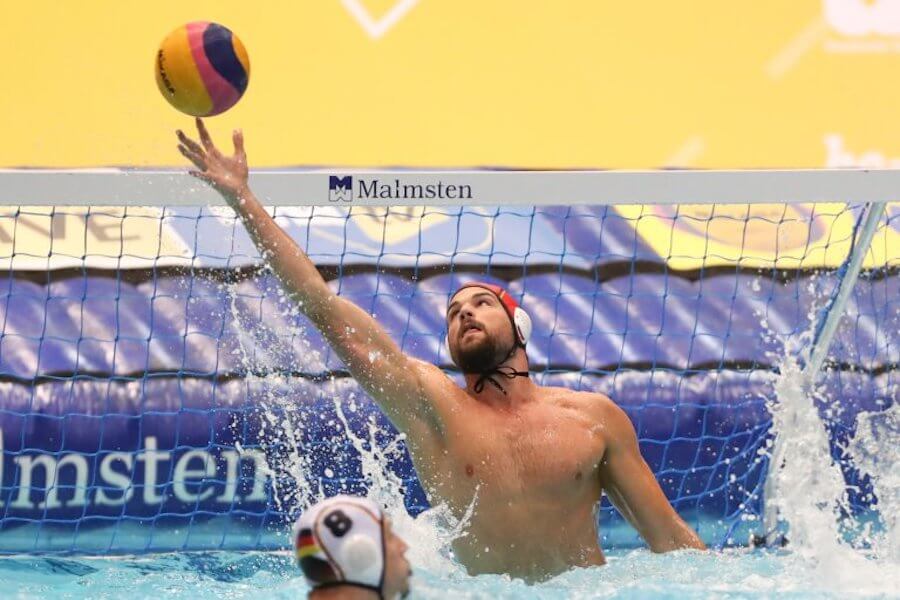
German goalie Moritz Schenkel. Photo Courtesy: FINA
With reduced rosters and daily matches all week, the well-conditioned Japanese may pull off an upset on Friday, when the top teams in Group A play lower ranked teams in Group B in cross-over play. It’s not likely Omoto can engineer an upset like he did in the FINA World League Super Final last June, when Japan, last in it’s group, surprised an unbeaten American squad 11-10. Both teams would need to make the semi-finals if they are to meet again in Berlin.
What will not be surprising is if the Germans, riding strong performances from Ben Reibel, Dennis Eidner and Julian Real and coached by Stamm—arguably the best polo player Germany has ever produced—continues an inspiring run with a sprint to Saturday’s semifinals.




.png)